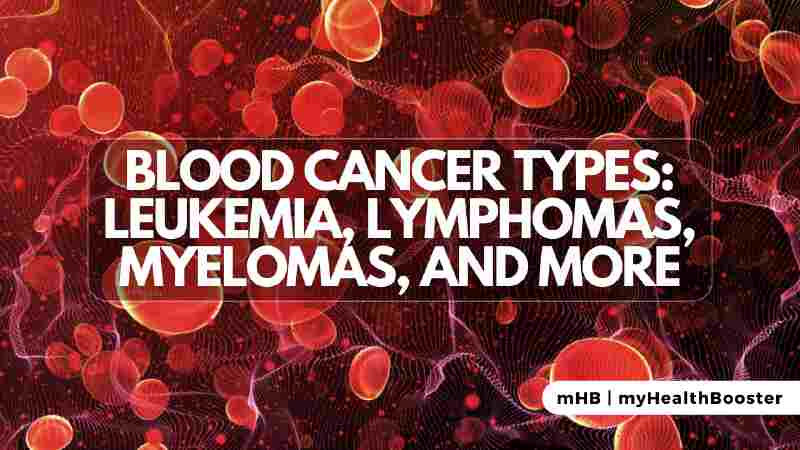Blood cancer encompasses a spectrum of diseases affecting various blood components, such as red blood cells, white blood cells, plasma, and platelets. This intricate system plays a crucial role in oxygen transport, nutrient delivery, immunity, waste removal, and blood clotting. Blood cancers, including leukemia, lymphoma, and myeloma, disrupt these functions by affecting specific blood components.
Risk Factors of Blood Cancer
Several factors elevate the risk of blood cancer, such as a familial predisposition, genetic conditions like Down’s syndrome, exposure to chemicals like benzene, smoking, prior cancer treatment, and infections like Epstein-Barr virus (EBV) and human immunodeficiency virus (HIV).
Lymphoma
Lymphoma, the most prevalent blood cancer, targets lymphocytes, a type of white blood cell found in the lymphatic system. The lymphatic system, crucial for immune function, becomes compromised when abnormal lymphocytes transform into cancer cells. Lymphoma manifests in various forms, with Hodgkin’s lymphoma being highly curable and non-Hodgkin’s lymphoma (NHL) more common in older adults.
Leukemia
Leukemia, a blood cancer originating in the bone marrow, disrupts the production of normal blood cells. With over 60 types, symptoms vary, including fever, fatigue, weight loss, swollen lymph nodes, and bone pain. Diagnosis involves blood tests and, if necessary, a bone marrow biopsy.
Myeloma
Myeloma results from cancerous plasma cells in the bone marrow, impacting the production of antibodies crucial for fighting infections. The symptoms range from bone pain to kidney issues. Diagnosis entails evaluating symptoms and conducting relevant tests.
Treatment Approaches
- Radiation and Chemotherapy: Traditional treatments like chemotherapy and radiation aim to eliminate cancer cells but may have side effects. Effective management of side effects is crucial.
- Stem Cell Transplant: This involves transplanting stem cells to regenerate healthy blood cells, sourced from the patient or a donor.
- Targeted Therapy: This innovative approach selectively targets cancer cells, minimizing damage to healthy cells. Immunotherapy, a subset, stimulates the immune system to combat cancer.
- Car T-Cell Therapy: This emerging immunotherapy genetically modifies T cells to target and destroy cancer cells, showing promise in leukemia and lymphoma.
Immunotherapy
Immunotherapy, or biological therapy, includes various strategies such as cytokine treatment, monoclonal antibodies, therapeutic cancer vaccines, radioimmunotherapy, and immune checkpoint inhibitors.
Research and New Treatments
Ongoing research explores genetic factors, gut microbes, diet, and other features influencing blood cancer treatment. Clinical trials offer hope for patients unresponsive to existing treatments, pushing the boundaries of medical advancement.
Summary
Understanding the diverse types of blood cancer and advancements in treatment is crucial for patients, caregivers, and the medical community. As research progresses, new therapies hold the promise of improved outcomes for those affected by these complex diseases.
References
- American Society of Hematology: “Blood Basics.”
- American Society of Hematology: “Blood Cancers.”
- American Cancer Society: “Viruses That Can Lead to Cancer.”
- Mayo Clinic: “Leukemia.”
- Cleveland Clinic: “Lymphatic System.”
- American Cancer Society: “What Is Non-Hodgkin Lymphoma?”
- Memorial Sloan Kettering Cancer Center: “Types of Lymphoma.”
- Leukemia & Lymphoma Society: “Hodgkin Lymphoma Subtypes.”
- Mayo Clinic: “Hodgkin’s Lymphoma (Hodgkin’s Disease).”
- Memorial Sloan Kettering Cancer Center: “Types of Lymphoma.”
- American Cancer Society: “What Is Non-Hodgkin Lymphoma?”
- Leukemia & Lymphoma Society: “NHL Subtypes.”
- Memorial Sloan Kettering Cancer Center: “Types of Lymphoma.”
- Mayo Clinic: “Lymphoma.”
- Leukemia & Lymphoma Society: “Leukemia.”
- Mayo Clinic: “Leukemia.”
- American Cancer Society: “What Is Multiple Myeloma?”
- American Cancer Society: “Signs and Symptoms of Multiple Myeloma?”
- American Cancer Society: “What Is Multiple Myeloma?”
- Leukemia & Lymphoma Society: “Leukemia.”
- Blood: “Proteasome Inhibitors in Multiple Myeloma: 10 Years Later.”
- National Cancer Institute: “Tyrosine Kinase Inhibitors,” “Treatment Research.”
